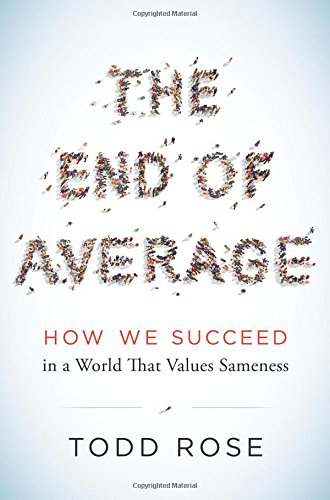Every day we are measured against the yardsticks of averages. The assumption that metrics comparing us to an average—like GPA, personality assessments, standardized test results, and performance review ratings—reveal something meaningful about our potential is so ingrained in our society that we rarely question it. That assumption, says Harvard’s Todd Rose, is spectacularly, and scientifically, wrong.
In The End of Average, Rose shows us that no one is average. We are all jagged, to use his word, or unique. Two people with the exact same average score on any multi-dimensional measurement will have completely different attributes, with hugely differing scores on the individual dimensions. This means that they will have unique strengths and weaknesses that are completely obscured if we only look at the average score.
Weaving science, history, and his experiences as a high school dropout who eventually earned a Ph.D. and a prestigious job, Rose brings to life the untold story of how we came to embrace the scientifically flawed idea that averages can be used to understand individuals. His writing is smooth and his arguments convincing. We can understand groups through looking at averages, but not individuals.
Rose offers three principles of individuality: the jaggedness principle (you can’t apply one-dimensional thinking to something that is complex, which of course includes people), the context principle (there is no such thing as a person’s essential nature, because our behavior depends on the context), and the pathways principle (there are many valid ways to reach the same outcome, and the paths people choose are based on their own individuality).
These principles seem a little obscure, but Rose clarifies them through great examples and interesting stories. For example, he talks about personality profiles. Personality tests are fun to take and give some interesting information. However, says Rose, “trait-based personality tests assume that we can be either extroverts or introverts…but not both.” Yet, everybody is both. We might be extroverted among our friends and introverted with strangers, or vice versa. “Sure, you could say someone was more introverted or extroverted on average…but if you relied on averages, then you missed out on all the important details of a person’s behavior.”
In terms of business, one of every company’s ongoing struggles is how to hire the right person for the right job. SAT scores and the prestige of a candidate’s alma mater are not predictive at all of success on the job. These are unidimensional scales that don’t uncover people’s individual talents. Successful hirers take into account the full complexities of a person’s talents. For example, instead of a resume, some companies ask job candidates to submit a statement of passion for the company and to answer a few questions about their abilities. These companies “feel like they have found a way to uncover diamonds in the rough, to identify unorthodox or hidden talent.” But, while they may have identified overlooked talent, there is nothing unorthodox or hidden about it. It is simply true talent, and it has always existed.
Rose talks about how Taylorism (Frederick Taylor wrote about standardization and management in his 1911 book, The Principles of Scientific Management) directed us down the path of a one-size-fits-all model, leading to factories where every job was standardized, schools where kids were funneled into high or low level reading groups and then on to college or vocational training, and the differentiation between workers and managers. He disagrees with this type of thinking, and instead supports the value of individuals. He sees the benefits of valuing individual employees as: increased employee engagement, increased productivity, and widespread innovation.
This is not a book about leadership or management, although it includes these concepts. It is about “how we succeed in a world that values sameness.” We need to think beyond averages and more about individuals, whether it is how they succeed in school, at jobs, or in life. It’s a fascinating read if you’re willing to wade through a compelling re-analysis of history and our basic assumptions about the world. In my opinion, it’s well worth the trouble.

